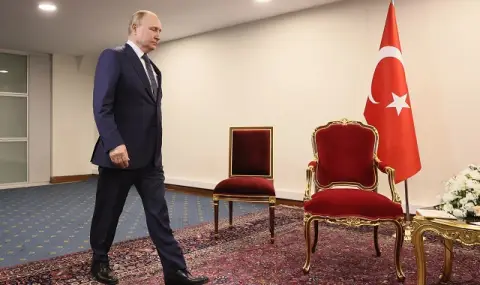Vladimir Putin seems to be particularly accommodating lately. In November, Kremlin sources revealed the Russian president’s willingness to discuss a ceasefire agreement, and earlier this month Putin said he was ready to compromise on Ukraine during talks with US President-elect Donald Trump.
Putin’s enthusiasm for negotiations seems puzzling. Why negotiate when he’s winning, asks Bethany Elliott, a specialist on Russia and Eastern Europe, in an article for the British publication UnHerd.
Russian forces are advancing on the battlefield, Moscow has troops and missiles from North Korea, and Trump has dismissed Ukrainian President Volodymyr Zelensky as “the biggest sellout on earth.” These favorable circumstances may explain why, while he claims there are no preconditions for talks, Putin is no longer taking the prospect seriously. At his end-of-year press conference, Putin said he would sign agreements only with the Ukrainian parliament and its speaker, in line with the Kremlin’s claim that the delayed elections had made Zelensky’s presidency illegitimate. The Russian president added that his counterpart in Kiev would have to be re-elected for Moscow to talk to him.
The practical complications are clear: Ukrainian lawmakers would have to take the time to organize and agree on the terms of a ceasefire across party lines, with the sheer number of participants providing greater opportunities for Russian manipulation. That’s before even considering the challenges of holding elections when voters are abroad or at the front. Putin also said last week that he would be open to Slovakia’s offer of peace talks. They would likely be welcomed by Slovakian Prime Minister Robert Fico, who has angered Kiev over his friendly relations with the Kremlin.
From the West’s perspective, this is the most dangerous strategy Russia could adopt: Putin sends positive signals but slows down the process with delays and arbitrary or unacceptable demands. The Kremlin hopes to make progress on the battlefield as the West shifts its focus from arms supplies to supporting negotiations, with promises of aid to Kiev in doubt due to uncertainty about the duration of the conflict.
So how do we get Russia to the negotiating table? Trump’s plan is to increase arms to Ukraine if Putin refuses. However, previous efforts have run into logistical obstacles, and the move could prove unpopular with his MAGA supporters. Another solution suggested by analysts is penalties for procrastination, with additional sanctions on Moscow and more arms deliveries to Kiev for every month without a deal. Yet the Kremlin has proven that it can circumvent sanctions, and Putin knows that the real danger to Ukraine is not a lack of weapons but a lack of people, which makes the Trump camp’s talk of “arming Ukraine to the teeth” actually quite toothless.
The Russian president is also aware that Trump may soon lose patience with prolonged negotiations and, having less influence over Russia than over Ukraine, may pressure Kiev to accept unfavorable terms just to reach an agreement. Zelensky suggested in late November that a deal could be reached if its remaining territory were “under the NATO umbrella.” Yet while expressing what he could accept, Putin emphasized what he could not.
On December 26, the Russian leader rejected the suggestion—considered central to Trump’s plan—that Ukraine would gain NATO membership within the next 20 years. Russian Foreign Minister Sergei Lavrov later reiterated Moscow’s displeasure with the idea, as well as the prospect, of a European peacekeeping force in Ukraine. In an apparent no-holds-barred move, he ruled out any engagement with Trump’s team until after his inauguration. Meanwhile, Lavrov’s announcement that Russia would abandon a moratorium on deploying nuclear missiles capable of hitting targets at medium and short ranges suggests that Moscow will not abandon its nuclear threats. Putin also signaled his refusal to back down on limiting Ukraine’s military to 85,000 troops, Ukraine’s permanent neutrality, and Kiev’s complete withdrawal from the Luhansk, Donetsk, Zaporizhia, and Kherson regions. These are demands on which Ukraine could be pressured to compromise.
All deals start with maximalist positions, but Putin has shown no interest in real compromises. He hopes he is not alone. The Kremlin is betting that the new "deal maker" in the White House will find this particular deal too boring and too late to merit more than a hasty effort.
